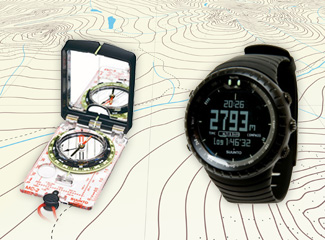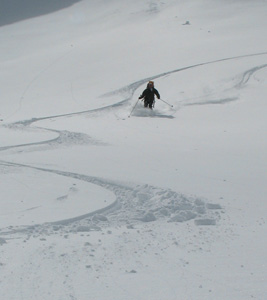Knowing at what altitude (elevation) you are at any moment while backcountry skiing is very important and can be also very beneficial. Lets take a look why this is the case, and how you may go about choosing an altimeter watch that suits your needs and fits your budget.
 This article is followed by “Buying altimeter watches that fit your needs and budget” guide to make your decision easier if you decide to by an altimeter watch.
This article is followed by “Buying altimeter watches that fit your needs and budget” guide to make your decision easier if you decide to by an altimeter watch.
For simplicity sake, terms “altitude” and “elevation” will be used interchangeably throught this article. (To see the difference read the first paragraph of Wikipedia article on Elevation.)
Case for knowing your altitude (having altimeter watch)
The single most important argument for knowing your altitude is safety as that can make or break your navigation.
The second argument is your benefit – meaning the luxury of knowing your altitude helps you make better choices towards enjoying your days even more by getting the best out of them.
Safety factor – navigation and general awareness
While backcountry skiing, on a single day trip or a multi-day traverse, we have couple of tools that support our decision making. Altimeter would be one of the tools along snow stability tests, weather observation skills, maps or compass. To use these tools correctly we need also experience which in itself becomes a tool then.
Having an altimeter watch, thus knowing your altitude, significantly helps you make safer choices in navigating through terrain because:
- If you have a map and compass but you don’t know what altitude you are at you can’t accurately figure out where you are on the map. Therefore it’s tough to make a decision where you should be going, safely.
- Or, if an avalanche bulletin says that there was a significant accumulation of snow above 2100m it’s good to know where the potential overloading of slopes begins.
The factor of knowing your altitude for navigation purposes is the most important one for your safety. And this becomes increasingly important on longer multi-day trips.
Once out there you are completely relying on a map, compass and altimeter (or GPS with altimeter). These three are like avalanche safety equipment – beacon, shovel and probe really work the best together. Leave one out and you have to deal with additional unnecessary problems.
Benefit factor – better skiing and comfort

Besides knowing which aspects (slopes face certain direction, e.i.: north, south…) to ski for the best snow at a given time, knowing your altitude can greatly help you with getting the most fun out of your runs.
Scenarios presented here are not always true as the conditions greatly vary from place to place and from time to time, but they demonstrate how altimeter can help you:
- At higher elevations the temperatures are lower on average. This means that if it rains up to 1900m the better skiing should be above this elevation.
- Also, precipitation increases the higher the altitude. That means deeper snow pack which usually means higher quality powder skiing. And better chances of face shots.
- On the other hand, places at higher elevations are often pounded by greater winds which can blow the snow away or form a hard wind-affected top layer that you penetrate through unpredictably while skiing. And that is no fun.
In the three cases above you can clearly see how knowing your altitude can make you help decisions where and when to ski to have the biggest blast.
Among other beneficial factors of knowing your altitude is comfort. Sure, once you are out and the elements are testing you, you enjoy but there is a limit to everything. Here are examples of what I mean by comfort factor, especially on multi-day trips:
- You need water but want to save gas for your stove (or time melting snow). Creeks with running water are more accessible (convenient to reach) at lower elevations.
- You may have trouble sleeping comfortably above certain altitude. Altimeter can help you find a spot without loosing significant vertical meters by letting you know where you are exactly while looking for a suitable place.
Altimeter watches
Now that points were made why knowing your altitude is important and beneficial we will take a look at some altimeter watches that will fit your needs and budget in the next article.
“Buying altimeter watches that fit your needs and budget” will provide you with tips on what you need to consider when buying an alti watch as well as it will introduce you to couple of models where each one has a specific use.
If you just want to browse online stores for watches take a look at ![]() Backcountry.com and
Backcountry.com and ![]() Altrec.com.
Altrec.com.


Leave a Reply